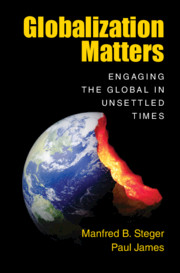Book contents
- Globalization Matters
- Globalization Matters
- Copyright page
- Contents
- Figures
- Acknowledgements
- 1 Introduction
- 2 Mapping a New Genealogy of ‘Globalization’
- 3 Rethinking the Dominant Framework of Globalization Theory
- 4 Considering the Subjective Dimensions of Globalization
- 5 Outlining an Engaged Theory of Globalization
- 6 Excavating the Long History of Globalization
- 7 Examining the Promise of Global Studies
- 8 Making Sense of the Populist Challenge to Globalization
- 9 Confronting the Global Urban Imaginary
- 10 Living in the Unsettled World of the Anthropocene
- 11 Concluding Reflections
- Appendices
- Bibliography
- Index
5 - Outlining an Engaged Theory of Globalization
Published online by Cambridge University Press: 01 August 2019
- Globalization Matters
- Globalization Matters
- Copyright page
- Contents
- Figures
- Acknowledgements
- 1 Introduction
- 2 Mapping a New Genealogy of ‘Globalization’
- 3 Rethinking the Dominant Framework of Globalization Theory
- 4 Considering the Subjective Dimensions of Globalization
- 5 Outlining an Engaged Theory of Globalization
- 6 Excavating the Long History of Globalization
- 7 Examining the Promise of Global Studies
- 8 Making Sense of the Populist Challenge to Globalization
- 9 Confronting the Global Urban Imaginary
- 10 Living in the Unsettled World of the Anthropocene
- 11 Concluding Reflections
- Appendices
- Bibliography
- Index
Summary
This chapter begins by outlining some of the principles that guide the work of engaged theory. We then elaborate these principles to show how engaged theory can be understood as a form of critical theory. Engaged theory is critical, but not for criticism’s sake. It is committed to making a positive difference in the world. By mapping the complexity of our world—locally and globally—our approach is intended to contribute to the process of engaging sensitively and practically with that world. By recognizing the messiness of that world while drawing out broad patterns of practice and meaning, it provides a new way of understanding that complexity. The chapter shows how our approach works across different levels of analysis to discern patterns of practice and meaning. It responds to five key questions. First, how should globalization be conceptualized? Second, should globalization be equated with material interconnectivity? Third, what dominant forms has globalization assumed throughout history? Fourth, what is the relationship between globalization and relations of power, domination, and subjection? And fifth, what is the relationship of globalization theory to social practice?
- Type
- Chapter
- Information
- Globalization MattersEngaging the Global in Unsettled Times, pp. 106 - 136Publisher: Cambridge University PressPrint publication year: 2019

